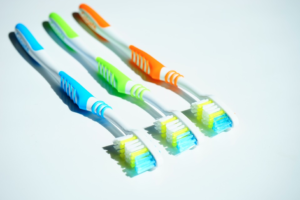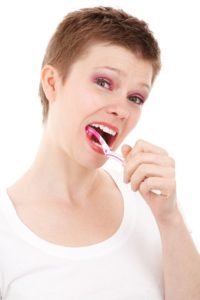Dentist Frisco
 You may not realize it, but you could be at risk of developing an unsightly medical condition known as hairy tongue. While it is harmless in most cases, hairy tongue is still an unpleasant ailment. The causes are not always completely known, but practicing good oral hygiene at home and visiting our dental office for cleanings can help prevent the issue. Here’s what you need to know.
You may not realize it, but you could be at risk of developing an unsightly medical condition known as hairy tongue. While it is harmless in most cases, hairy tongue is still an unpleasant ailment. The causes are not always completely known, but practicing good oral hygiene at home and visiting our dental office for cleanings can help prevent the issue. Here’s what you need to know.
What is hairy tongue?
With hairy tongue, your tongue may look like its covered in fuzz or hair, but this condition is actually caused by an accumulation of bacteria. The surface of your tongue is covered in small, rough papillae which gives it its rough texture. Overtime, these papillae grow, shed, and are replaced. Occasionally, the older papillae may fail to shed properly. This causes a buildup on the tongue and can cause a hair-like appearance.
Who is at risk of hairy tongue?
According to the American Academy of Oral Medicine, as much as 13% of the population may have hairy tongue. Anyone can develop the condition, but certain risk factors such as age and tobacco use increase your chances.
What causes hairy tongue?
While the exact causes of hairy tongue are not known, there are a variety of factors that can put you at a higher risk of developing the condition. Poor oral hygiene and a diet of soft foods can put you at an increased risk, as a lack of stimulation on the tongue can prevent the shedding of older papillae. Excessive consumption of certain substances, including tobacco, alcohol, coffee, and tea have been shown to contribute to this condition. Dehydration and dry mouth can slow down the tongue’s natural refresh cycle of replacing papillae.
The best defense against hairy tongue is a regular at-home oral hygiene routine that includes twice daily brushing, flossing, and mouthwash. Visiting our practice at least twice a year for cleanings can also give us an opportunity to regularly examine your mouth and catch any early signs of hairy tongue.
If you’re past due for your regular cleaning or are concerned that you might be developing hairy tongue, don’t hesitate to contact our practice for an appointment today.

 A happy smile is a healthy smile! There are a number of steps you can take to keep your smile healthy by reducing your risk of developing tooth decay. Here are a few suggestions from our team.
A happy smile is a healthy smile! There are a number of steps you can take to keep your smile healthy by reducing your risk of developing tooth decay. Here are a few suggestions from our team. Do you ever think about your toothbrush? You use it twice a day, but how much do you know about it? We’ve compiled a list of interesting toothbrush facts. The next time you brush, consider these bits of trivia.
Do you ever think about your toothbrush? You use it twice a day, but how much do you know about it? We’ve compiled a list of interesting toothbrush facts. The next time you brush, consider these bits of trivia. Did you know that tooth decay is the single largest cause of school absences? The longer decay goes untreated, the worse it gets. Not only can this mean costlier expenses for you, but it also jeopardizes your child’s oral health and education. You can help your child have a healthy, happy smile by taking a few steps to defend against tooth decay. Here are three steps you can take at home.
Did you know that tooth decay is the single largest cause of school absences? The longer decay goes untreated, the worse it gets. Not only can this mean costlier expenses for you, but it also jeopardizes your child’s oral health and education. You can help your child have a healthy, happy smile by taking a few steps to defend against tooth decay. Here are three steps you can take at home. By now, you have likely seen news reports questioning whether flossing is necessary for your oral health.
By now, you have likely seen news reports questioning whether flossing is necessary for your oral health. Dry mouth can be very uncomfortable for people. Dry mouth, or xerostomia, can cause patients to have difficulty speaking, tasting, chewing and swallowing. It can also cause bad breath. What many people don’t know is that dry mouth can significantly contribute to a rise in cavities, demineralization of teeth, teeth sensitivity and oral infections.
Dry mouth can be very uncomfortable for people. Dry mouth, or xerostomia, can cause patients to have difficulty speaking, tasting, chewing and swallowing. It can also cause bad breath. What many people don’t know is that dry mouth can significantly contribute to a rise in cavities, demineralization of teeth, teeth sensitivity and oral infections. Calcium is an important mineral for building strong, healthy teeth, but not everyone can tolerate the lactose found in dairy. Lactose is a sugar found in milk and other dairy products. About 65% of people have reduced ability to process lactose past infancy.
Calcium is an important mineral for building strong, healthy teeth, but not everyone can tolerate the lactose found in dairy. Lactose is a sugar found in milk and other dairy products. About 65% of people have reduced ability to process lactose past infancy. In addition to brushing your teeth twice each day and flossing at least once, it is also important to take good care of your tongue. Bacteria can build up on your tongue throughout the day. For some patients, using a tongue scraper can be the best solution for a cleaner, healthier tongue.
In addition to brushing your teeth twice each day and flossing at least once, it is also important to take good care of your tongue. Bacteria can build up on your tongue throughout the day. For some patients, using a tongue scraper can be the best solution for a cleaner, healthier tongue. Nearly everyone has at least one habit that they wish they could break. Did you know that some of them can affect your oral health? Here are a few common habits and tips for how to break them.
Nearly everyone has at least one habit that they wish they could break. Did you know that some of them can affect your oral health? Here are a few common habits and tips for how to break them.